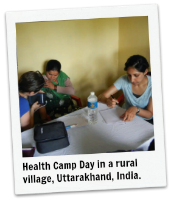Written by Nav Sidhu (Class of 2016, VFMP)
This past summer I had the opportunity to travel to Uttarakhand, a province in northern India, as apart of the Voice of the Children (VOC) Global Health Initiative (GHI) project. For four weeks myself and three other medical students worked alongside two local NGOs called AMAN and VIMARSH. This program has been running for a number of years, and this year the project began a transition from having UBC team members conduct culturally sensitive workshops on various health topics in rural villages to training members of the community to run these workshops themselves. This change was brought about to introduce sustainability to the project so it can continue after UBC’s involvement is retracted. Before we departed for India, we conducted a literature search on existing training programs for community health workers. With the help of the entire VOC program, a training proposal based on our findings was created and shared with the NGOs. The goal of this is to help advance the project as the NGOs will use this proposal to aid in selecting and training community members.
There were some discrepancies in what we found in our literature search and what we saw in India. Primary health centers (PHCs) are healthcare facilities that are meant to provide basic ongoing care to the people in rural villages of India. As part of our project a one-day health camp, run with two doctors, was conducted at a PHC where we helped in measuring the blood pressure, height, and weight of community members. We arrived at the building expecting it to be fully functional and ready for the health camp, only to find that it had actually been closed for several months. There were spider webs and dust everywhere and there were no medical supplies apart from a patient bed. The NGO staff accompanying us told us that the lack of doctors in these remote communities means that there is currently no running health center despite the available space. To me this was just one of the examples that demonstrated the barriers to accessing healthcare experienced by these communities.
The weather can also be unpredictable and pose many challenges, especially when travelling. Monsoons that usually occur in July came a month early and caused extensive damage and destruction to the areas we were visiting. We were living in a remote village on top of a mountain that was accessible only by a two-hour hike when the rainfall started. Having never experienced a monsoon before we didn’t realize that the constant downpour would last over three days. We were stuck in a home that was made of mud and had a tin roof without access to electricity or running water. By the end of the rains, the architecture of the house had been deeply compromised. It made me realize that the hardships imposed on the villagers by weather alone are of a huge magnitude since this kind of destruction happens yearly. These villages face even more immediate problems than accessing healthcare.
Another issue we faced was that the gaps between the NGOs’ expectations and the UBC GHI goals for the project were evident from our first day on the ground in India. We were expecting not to be conducting the workshops on our own but instead to be evaluating local community members conducting them on topics such as maternal health, water hygiene and health for adolescent girls. However, we were asked by the NGOs to do all the workshops in the villages, sometimes without a translator being present. I now appreciate that some level of a gap between the NGOs and our UBC team should have been expected due to the language and geographical barriers.
Adaptability and improvisation are vital when dealing with the different cultural, economic and political systems of a developing country. As with any global health project, there were times of both frustration and enjoyment throughout the month I spent in India. Working with the NGOs and living with the welcoming community members was an experience I will always value. The most important lesson that I learned was that no matter what you read in articles or hear from other peoples’ personal experiences, you cannot appreciate the magnitude of the problems faced by these rural communities until you experience them yourself.